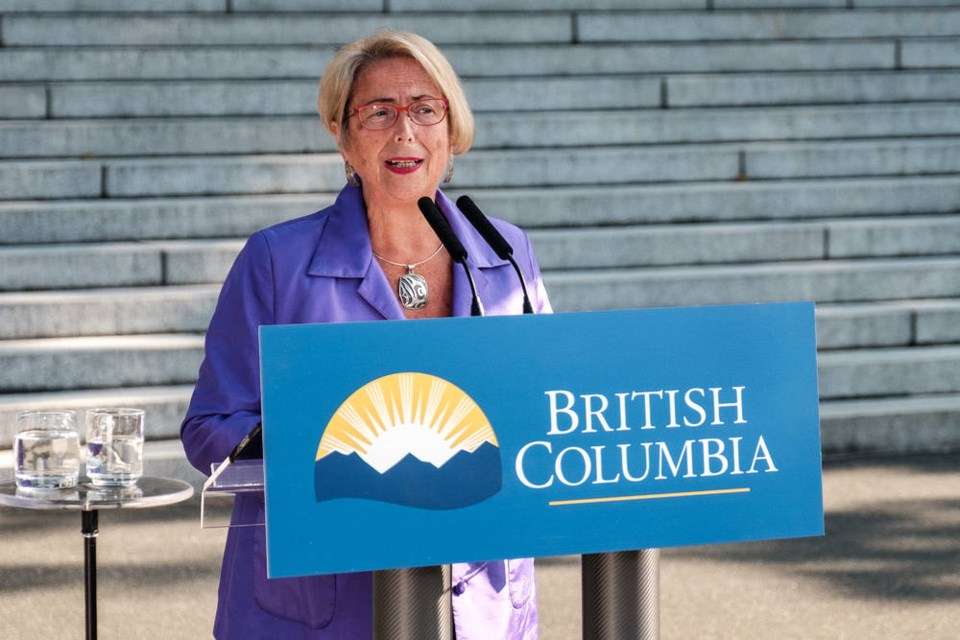The provincial government is funding 123 new addiction treatment and detox beds for youth across B.C. — something a Victoria-based outreach agency says is desperately needed to get young people out of the cycle of addiction.
Judy Darcy, the minister of mental health and addictions, told the Times Colonist that some of those treatment beds will be on Vancouver Island, which does not have any specialized residential treatment beds for youth.
“The beds are going to go in the areas with the greatest need, and clearly Vancouver Island is an area of greatest need,” she said.
The $36-million investment over the next 2 1/2 years will more than double the number of treatment beds for youth ages 12 to 24 in B.C., Darcy said.
“For too long in this province, youth who were struggling with addiction had to face long, long wait times for care and the options for substance use treatment and care were also very limited,” she said at a press conference. “That’s why building more healing spaces, more access points for youth to get the help that they need to cope with addictions is more important now than it ever has been.”
Colin Tessier, executive director of Victoria-based Threshold Housing Society, which provides transitional housing to at-risk youth, said the new youth treatment beds are desperately needed.
“The need in our community, it’s quite dire, quite literally,” he said. “We really need to catch up.”
He said the funding will go a long way to reducing wait-lists for addictions treatment, but called for continued investment in housing, supportive recovery beds, harm-reduction measures and long-term addictions counselling.
The society provides housing to 37 youth who are struggling with addictions, at risk of homelessness, aging out of the child welfare system or fleeing violence in their home. Tessier said 80 per cent of youth the society works with have substance use or mental health issues.
When a young person decides they want to pursue treatment, those options need to be available immediately, Tessier said. Currently, youth looking to get into treatment are told the wait is six to eight weeks.
“That window of clarity and the desire to seek help can shut so quickly,” he said.
Tessier said early intervention, before youth are deeply entrenched in their substance use, can save lives.
“Directing resources to youth in our community provides an opportunity to change the life trajectory of someone looking down a very dark path,” he said. “Targeted supports and interventions at a young age can have a tremendous and long-lasting impact.”
The new treatment beds will include detox beds where medical staff can help manage people’s withdrawal symptoms, residential recovery beds that get youth out of high-risk living situations, and more specialized residential treatment beds with 24-hour support from psychiatric nurses.
Darcy did not have specifics on where the treatment beds will be located or how soon they will be ready. Some agencies that already provide addictions treatment for youth can apply to expand their programs and some treatment beds will be added to communities with limited options for youth, Darcy said. The ministry is working with health authorities to determine where they are needed the most, she said.
“We know that there are critical gaps in services for youth and we know that health authorities will be working with us around the clock to expand existing facilities and to create new spaces so that these beds can be available quickly, because they’re needed quickly,” Darcy said.
May and June were the deadliest months to date in B.C.’s overdose crisis, with 175 illicit drug deaths in June and 171 in May. Between January and June of this year, 60 people under the age of 24 died of an illicit drug overdose.
Darcy said she’s talked to many parents who have lost children to drug overdoses and heard their frustration of knocking on door after door in trying to get help for their child’s addiction.
This month, the province announced the opening of a 20-bed addictions treatment facility called Traverse in Chilliwack. Before that, there were only 104 addictions treatment beds, detox beds or residential recovery beds for youth in B.C.
Sharlene Law, executive director of the Umbrella Society, which provides support to people struggling with addiction, said she welcomes the funding for youth treatment beds but would also like to see more treatment beds for adults, especially women.
“I’m hoping that some of these youth beds are on the Island. Youth should not have to go to the mainland to go and get well, which they currently have to do,” Law said.
Darcy said she’s heard from Island service providers and families that young people struggle when they go into treatment away from their family and community.
“We know that recovery works best if people remain connected to culture and family and community,” she said.
Law said addictions services for youth have been limited because of the COVID-19 pandemic so youth “are really, really struggling.”
In June, Darcy announced that the province will spend $13.5 million to fund 50 to 70 new adult treatment and recovery beds across B.C. over the next three years. There are also 45 additional mental-health and substance-use acute-care beds at Royal Columbian Hospital mental-health centre in the Fraser Valley, the ministry said.



